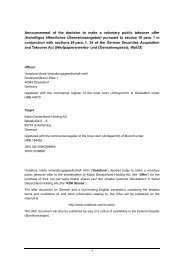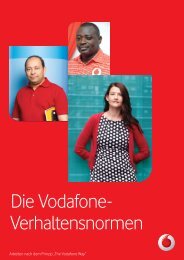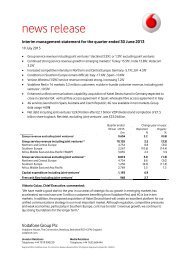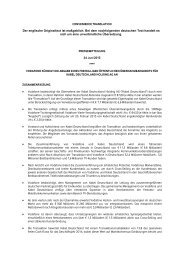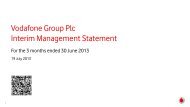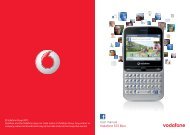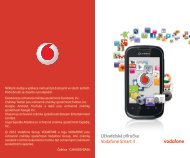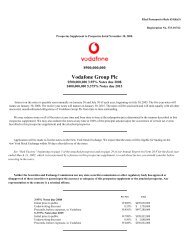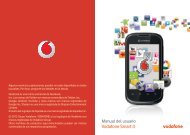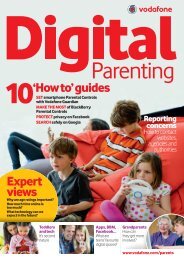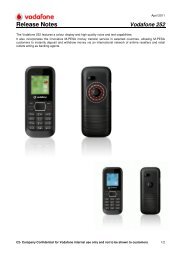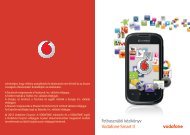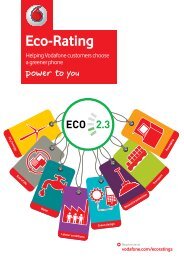Sustainability Report - Vodafone
Sustainability Report - Vodafone
Sustainability Report - Vodafone
Create successful ePaper yourself
Turn your PDF publications into a flip-book with our unique Google optimized e-Paper software.
Our strategy<br />
Our performance in 2010/11<br />
Empowering women<br />
through mobile<br />
Women constitute the world’s largest consumer spend<br />
segment, but over 300 million1 fewer women than men in<br />
emerging markets have a mobile phone. By tailoring our<br />
services for women, we aim to attract more female customers<br />
at the same time as bringing the benefits of better access<br />
to telecommunications to them and their families. A GSMA<br />
survey of mobile phone users has revealed that 85% feel more<br />
independent as a result of ownership and 41% report better job<br />
and economic opportunities.<br />
<strong>Vodafone</strong> is committed to the United Nations’ Women’s<br />
Empowerment Principles and takes part in the GSMA mWomen<br />
programme, a public – private partnership championed by<br />
Cherie Blair and Hilary Clinton that aims to bring 150 million<br />
more mobile connections to women over the next three<br />
years. We sponsored the mWomen ‘Bottom of the Pyramid<br />
Applications Challenge’ to promote the creation of applications<br />
that meet women’s needs.<br />
Providing financial services via mobile<br />
Using mobile technology to bring financial services to people without bank accounts offers<br />
significant development benefits and commercial opportunities for our business. <strong>Vodafone</strong><br />
M-Pesa enables people in emerging markets to send money to their families and pay for<br />
goods or services via their mobile phones. It is cheaper than wiring money, safer than<br />
carrying or sending cash, and combats the potential for corruption along the way.<br />
The uptake of <strong>Vodafone</strong> M-Pesa continues to grow. Globally, the number of customers<br />
almost doubled in 2010/11 to around 20 million, who collectively transfer over US$500<br />
million a month. There are 13.5 million registered customers in Kenya alone, where<br />
we have expanded the range of financial functions available to include access to bank<br />
accounts via mobile for the first time. We are also collaborating with ICICI and HDFC banks<br />
to pilot a mobile money transfer service in India, where our growing customer base offers<br />
a huge opportunity to reach the unbanked.<br />
By enabling international payments, we are helping people who are working abroad to<br />
send small amounts of money home faster and more conveniently than ever before.<br />
International remittances can make a significant contribution to national income and<br />
economic development. Our strategy is focusing on how we can better serve customers<br />
needing to send and receive payments from abroad.<br />
Supporting health services<br />
We see tremendous opportunities for mobile solutions to make healthcare more efficient.<br />
Improving basic healthcare in emerging markets is a considerable need and a key global<br />
development goal. Combined with ageing populations and increasing rates of obesity and<br />
diabetes in developed markets, this offers potential for substantial new revenue streams.<br />
Our dedicated <strong>Vodafone</strong> mHealth Solutions business aims to realise this potential. In<br />
emerging markets, we are using mobile to improve access to medicine by, for example,<br />
tracking and managing the supply of drugs to make sure they go where they are most<br />
needed. Our Mobile Relationship Manager service, used to manage supplies of malaria<br />
drugs, is the first mHealth solution to be scaled up commercially on a national scale<br />
– across Tanzania. Rollout of our mobile health enablement platform also continues,<br />
helping community caregivers in South Africa work more efficiently by inputting and<br />
accessing patients’ medical records via their mobile phone.<br />
The opportunities for <strong>Vodafone</strong>’s services to contribute to sustainable development<br />
are vast and we are currently exploring how they could be used to support sustainable<br />
agriculture (see Focus on food, page 5). We are also investigating the potential to use<br />
our network infrastructure to provide affordable, renewable power to rural communities<br />
beyond the reach of energy grids. This would not only help to alleviate energy poverty –<br />
a key development issue – but also promote lower carbon societies (see page 7).<br />
Read more at vodafone.com/sustainability<br />
We are also establishing our own development projects with<br />
women in mind. Our Al Johara programme, for example, enables<br />
Qatari women to learn entrepreneurial skills and earn a living by<br />
selling <strong>Vodafone</strong> products and services to their communities. In<br />
India, we support women in self-help groups by training them<br />
to become <strong>Vodafone</strong> retailers, providing finance management<br />
tools and offering information about health, hygiene and social<br />
issues via mobile.<br />
1 GSMA <strong>Report</strong>, Women and Mobile: A Global Opportunity<br />
US$500 million<br />
a month transferred by<br />
20 million customers<br />
globally using <strong>Vodafone</strong><br />
M-Pesa in 2010/11.<br />
Our innovative products<br />
and services offer a host of<br />
development benefits – from<br />
access to financial services for<br />
the unbanked to more efficient<br />
healthcare.<br />
<strong>Vodafone</strong> Group Plc <strong>Sustainability</strong> <strong>Report</strong> for the year ended 31 March 2011 4



